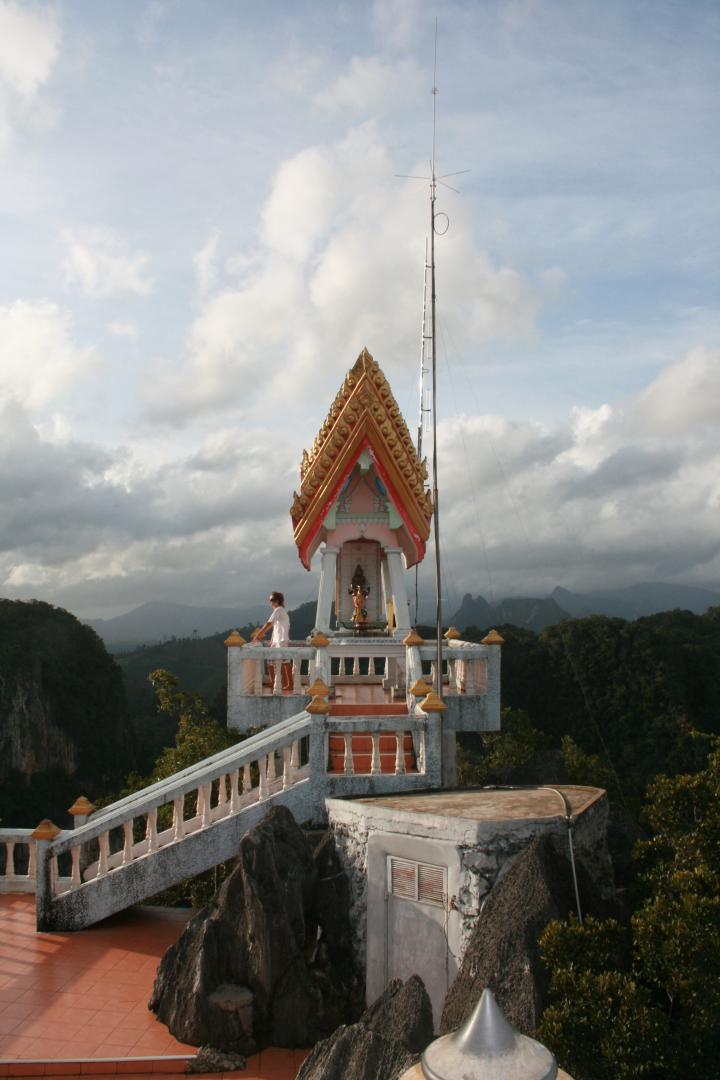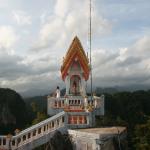Silent Meditation on Koh Phanyan
The tiny shaven-headed nun stands, bows and leaves us. All 27 of us file silently out of the hall. Eye contact is avoided and fledgling friendships are forgotten as each guest begins to withdraw inside their own head.
A gong marks the transition from sitting meditation to walking meditation. As the sun begins to rise I find myself walking very slowly down a sandy path. I am not going anywhere, when I reach the end I simply turn around and walk back. I do this for two hours. In a stolen moment I scan the faces of my fellow meditators, their heads are hung low and their faces are eerily empty. Tears stream down a muscular, bald-headed man's face, yet his expression doesn't change.
Koh Phanyan is not a place that often conjures up images of such peace, calm and serenity. Better known for it debaterous full-moon parties, this pulsating little Thai island does in fact have a rather more peaceful side. Perched precariously atop a rocky peak stands Wat Kow Tahm. The unassuming Buddhist Monastery has been running silent meditation retreats for Westerners for 24 years. Now, I'm no Buddhist, while many aspects of the religion interest me, not once have I ever attempted to meditate. I'm not exactly the silent type either. I'm a talker, I like to laugh, I like to express myself. I also have the attention span of a goldfish. Why then, you may be asking, would I choose to spend 10 days in total silence, why would I choose to get up at 4am every morning after sleeping on a bare wooden bunk all night, why would I choose to walk along a sandy path that leads nowhere, why would I choose to sit still for three hours at a time with my eyes shut, concentrating only on the sounds of my breath? I do not really have answers for these questions except to say that I was, in some way drawn to this retreat while wandering past a modest sign for the monastery, hung over, sunburnt and exhausted. And I really must have been drawn to it because I set about scaling an almost vertical mini-mountain in my fragile state to reach it.
The entrance to the retreat is plastered in posters warning you how gruelling the schedule is. People who've never meditated are strongly advised to turn around and head home. I'm not that easily deterred though. The simple dining area at the entrance is strewn with grubby backpacks and teeming with fisherman pant-clad Westerners, all trying to squeeze in their last few words before we are all plunged into silence. While we are surrounded by each other, essentially we are alone, forbidden from eye contact, talking, smiling, touching or any other form or communication. According to our hosts, Steve and Rosemary Weissman, the silence is an essential part of the experience. Interaction with people creates thoughts, and thoughts create distractions.
Steve, an American and Rosemary, an Australian started running retreats for Westerners at the monastery in 1988. Skinny and pasty, Steve wears his trousers far too high and looks like those sweet old guys in American movies called Herb, but pronounced ‘Erb'. Rosemary reminds me of a 1950s schoolmistress, with her waist-length grey pleat and totally climate-inappropriate ankle-length black skirt. They both look like they need a good feed, but they have this sort of loving, calming energy about them.
We are woken at 4am by a bell and make our way to the meditation hall. I sit on a musty red cushion for two hours trying to think only about the sensation of air going into my nostrils and the sensation of air coming back out of my mouth again.
A good 20 minutes of that time is spent sleeping, my face buried in my hands. The rest of it is spent trying to battle the relentless army of thoughts invading my mind. They are not going to be easy to defeat. Walking meditation, which involves walking up and down a track zombie-style, concentrating only on your footsteps, feels a bit like being a patient in a mental institution. Like we've been let out for our daily wander and are aimlessly staggering about wondering who the hell we are and what the hell we're doing.
The first few days continue like this. We sit, we breathe in unison, we eat a lot of rice, we walk like zombies, we listen to talks from our ‘gurus'. Along with communication, reading and writing are also banned (although I cheated a little bit on the writing front). There is no escape from your own mind. Many people have emotional responses to being trapped inside their own heads. Some cry, some look so vacant I begin to wonder if their brain is still functioning. These first few days seem futile. I'm not one of the criers, nor am I one of the trance-induced zombies. I spend the vast majority of my day singing along to music that seems to play on repeat inside my head. Most notably, Queen's "I want to break free" (I wonder what inspired that), Usher's "Oh my god" and, more randomly Nena Cherry's "99 red balloons". Quite an eclectic mix I have going on.
Night times in my room, which I share with another girl often prove to be quite awkward, shuffling around the tiny space and trying to negotiate light turning-off and door-locking times when you can't look at or speak to someone is quite a tricky task. I feel a bit like we've had a huge argument and can't bear to look at each other. This seems to trick your brain into thinking that you do not like this person and encourages you to view them in a hostile way. It's very strange indeed and really makes you appreciate just what a vital form of communication a friendly smile can be.
So far I have been getting sporadic urges to pack up my bags and sprint off down the mini-mountain, screaming at the top of my lungs as I go. The thought of 10 days of this seems punishing at best and totally impossible at worst. I have a niggling worry at the back of my mind that I might go insane, that I might have to adopt a grubby old football and paint a face on it like Tom Hanks in Castaway, just so I have someone to talk to. And then came my ‘break-through'. The ‘break-through' is what Steve and Rosemary describe as the moment when everything seems to fall into place, you feel like you can meditate, your appreciation for things grows, you actually begin to enjoy the experience and start to feel the benefits.
My break-through comes on day 3 when, while doing walking meditation, out of sheer boredom I begin staring at a red caterpillar on the ground. I watch in fascination at the intricate movements of its perfectly formed body as it rises and falls. I watch as it pounces on an ant, enveloping it in its body then devouring it whole. The process captivates me. It makes me feel happy. Never, in normal life would I notice this before. I am starting to appreciate the little things in life and how wonderful, yet overlooked they can be. I find I actually begin to meditate properly too. My battle with the invading thought-army continues, but they've eased off. I can go for at least six minutes at a time now without a single thought entering my head.
Steve and Rosemary's evening talks are genuinely fascinating, it is like they've climbed inside our heads and are reading our thoughts. They tell us what we are feeling and thinking and they are so spot-on it's scary. How on earth do they know I was obsessing over the break-up of my last relationship rather than meditating this morning?! It's clear they really know their stuff.
Repressing communication, I have decided, knocks off a good 20 years to my mental age. Things that you may have cracked a smile at before become the most hilarious experiences of your life. When I hear the tiny 91-year-old nun let out a humungous burp during walking meditation I am crying with laughter. I am literally in bits, shaking, tears of hilarity pouring down my face.
As I hear the irritating ring of the familiar wake-up bell on the morning of day 10 I am filled with an odd mixture of emotions. I am relieved but I am scared. What if I've forgotten how to speak? What if my social skills have died a death? Being silent for this long is like being in a strangely comforting cocoon. There are no pressures to say the right thing, or worries about saying the wrong thing. You do not have the pressures of interacting with people. It is a deeply personal journey.
The moment when Steve and Rosemary tell us we can speak is a daunting one. An Australian girl, who I'd been 100% sure was German asks me my name and I manage to croak it out, sounding shaky and broken. At least I can still speak. It's interesting to see just how wrong your judgments on a person's outward appearance can be. The crying man is an outspoken, smiley Dutch boxing coach. The Chinese woman whose chin was permanently attached to her chest now throws her head back with laughter. It is a different world.
Steve and Rosemary's final talk clarifies everything I realise I have learnt from shutting up for 10 days into one small nutshell - appreciation. By learning to appreciate the tiniest things in the world, a perfectly formed insect, a beautiful flower, the hard work of an army of ants, you are able to really appreciate the bigger things, leading to a far more positive outlook on life in general. I'm not sure if my appreciation for these perfectly-formed insects and beautiful flowers was born out of literally having nothing else to do but stare at them all day or from accessing far-flung corners of my mind while deep in meditation. But whichever one it was, it seems to have worked.
 ThingsAsian
ThingsAsian














